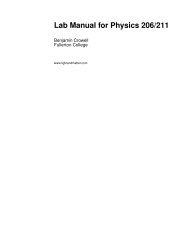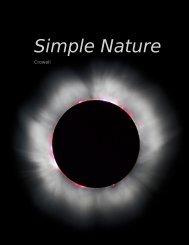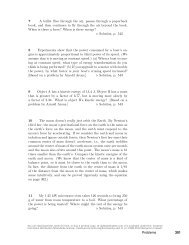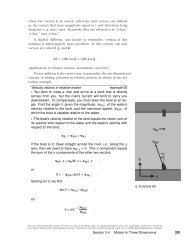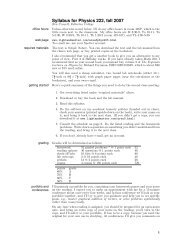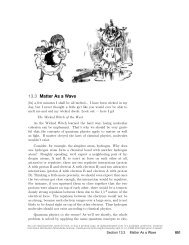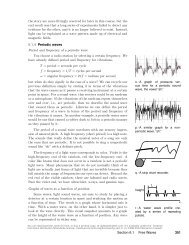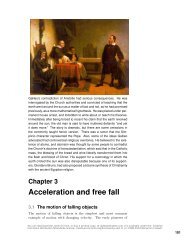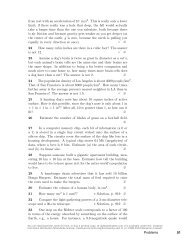Attention! Your ePaper is waiting for publication!
By publishing your document, the content will be optimally indexed by Google via AI and sorted into the right category for over 500 million ePaper readers on YUMPU.
This will ensure high visibility and many readers!

Your ePaper is now published and live on YUMPU!
You can find your publication here:
Share your interactive ePaper on all platforms and on your website with our embed function

Simple Nature - Light and Matter
Simple Nature - Light and Matter
Simple Nature - Light and Matter
- No tags were found...
Create successful ePaper yourself
Turn your PDF publications into a flip-book with our unique Google optimized e-Paper software.
their maxima at the same time. In a lightbulb, the moment ofmaximum power is when the circuit is most rapidly heating thefilament. At the instant when P = 0, a quarter of a cycle later, nocurrent is flowing, <strong>and</strong> no electrical energy is being turned into heat.Throughout the whole cycle, the filament is getting rid of energy byradiating light. 7 Since the circuit oscillates at a frequency 8 of 60 Hz,the temperature doesn’t really have time to cycle up or down verymuch over the 1/60 s period of the oscillation, <strong>and</strong> we don’t noticeany significant variation in the brightness of the light, even with ashort-exposure photograph.Thus, what we really want to know is the average power, “average”meaning the average over one full cycle. Since we’re coveringa whole cycle with our average, it doesn’t matter what phase weassume. Let’s use a cosine. The total amount of energy transferredover one cycle is∫E =dEad / Power in a resistor: therate at which electrical energy isbeing converted into heat.=∫ T0dEdt dt ,where T = 2π/ω is the period.E ===∫ T0∫ T0∫ T0P dtP dtI o V o cos 2 ωt dt∫ T= I o V o cos 2 ωt dt0= I o V o∫ T01(1 + cos 2ωt) dt27 To many people, the word “radiation” implies nuclear contamination. Actually,the word simply means something that “radiates” outward. Naturalsunlight is “radiation.” So is the light from a lightbulb, or the infrared lightbeing emitted by your skin right now.8 Note that this time “frequency” means f, not ω! Physicists <strong>and</strong> engineersgenerally use ω because it simplifies the equations, but electricians <strong>and</strong> techniciansalways use f. The 60 Hz frequency is for the U.S.Section 10.5 LRC Circuits 611
Inductors tend to be big, heavy, expensive circuit elements, so asimple surge protector would be more likely to consist of a capacitorin parallel with the computer. (In fact one would normally justconnect one side of the power circuit to ground via a capacitor.)The capacitor has a very high impedance at the low frequency ofthe desired 60 Hz signal, so it siphons off very little of the current.But for a high-frequency signal, the capacitor’s impedance is verysmall, <strong>and</strong> it acts like a zero-impedance, easy path into which thecurrent is diverted.The main things to be careful about with impedance are that(1) the concept only applies to a circuit that is being driven sinusoidally,(2) the impedance of an inductor or capacitor is frequencydependent.Discussion QuestionA Figure z on page 607 shows the voltage <strong>and</strong> current for a capacitor.Sketch the q-t graph, <strong>and</strong> use it to give a physical explanation of thephase relationship between the voltage <strong>and</strong> current. For example, why isthe current zero when the voltage is at a maximum or minimum?B Figure ac on page 609 shows the voltage <strong>and</strong> current for an inductor.The power is considered to be positive when energy is being put into theinductor’s magnetic field. Sketch the graph of the power, <strong>and</strong> then thegraph of U, the energy stored in the magnetic field, <strong>and</strong> use it to givea physical explanation of the P-t graph. In particular, discuss why thefrequency is doubled on the P-t graph.C Relate the features of the graph in figure ac on page 609 to the storytold in cartoons in figure m/2-3 on page 598.10.5.8 PowerHow much power is delivered when an oscillating voltage is appliedto an impedance? The equation P = IV is generally true,since voltage is defined as energy per unit charge, <strong>and</strong> current isdefined as charge per unit time: multiplying them gives energy perunit time. In a DC circuit, all three quantities were constant, butin an oscillating (AC) circuit, all three display time variation.A resistorFirst let’s examine the case of a resistor. For instance, you’reprobably reading this book from a piece of paper illuminated bya glowing lightbulb, which is driven by an oscillating voltage withamplitude V o . In the special case of a resistor, we know that I <strong>and</strong>V are in phase. For example, if V varies as V o cos ωt, then I will bea cosine as well, I o cos ωt. The power is then I o V o cos 2 ωt, which isalways positive, 6 <strong>and</strong> varies between 0 <strong>and</strong> I o V o . Even if the timevariation was cos ωt or sin(ωt+π/4), we would still have a maximumpower of I o V o , because both the voltage <strong>and</strong> the current would reach6 A resistor always turns electrical energy into heat. It never turns heat intoelectrical energy!610 Chapter 10 Fields
their maxima at the same time. In a lightbulb, the moment ofmaximum power is when the circuit is most rapidly heating thefilament. At the instant when P = 0, a quarter of a cycle later, nocurrent is flowing, <strong>and</strong> no electrical energy is being turned into heat.Throughout the whole cycle, the filament is getting rid of energy byradiating light. 7 Since the circuit oscillates at a frequency 8 of 60 Hz,the temperature doesn’t really have time to cycle up or down verymuch over the 1/60 s period of the oscillation, <strong>and</strong> we don’t noticeany significant variation in the brightness of the light, even with ashort-exposure photograph.Thus, what we really want to know is the average power, “average”meaning the average over one full cycle. Since we’re coveringa whole cycle with our average, it doesn’t matter what phase weassume. Let’s use a cosine. The total amount of energy transferredover one cycle is∫E =dEad / Power in a resistor: therate at which electrical energy isbeing converted into heat.=∫ T0dEdt dt ,where T = 2π/ω is the period.E ===∫ T0∫ T0∫ T0P dtP dtI o V o cos 2 ωt dt∫ T= I o V o cos 2 ωt dt0= I o V o∫ T01(1 + cos 2ωt) dt27 To many people, the word “radiation” implies nuclear contamination. Actually,the word simply means something that “radiates” outward. Naturalsunlight is “radiation.” So is the light from a lightbulb, or the infrared lightbeing emitted by your skin right now.8 Note that this time “frequency” means f, not ω! Physicists <strong>and</strong> engineersgenerally use ω because it simplifies the equations, but electricians <strong>and</strong> techniciansalways use f. The 60 Hz frequency is for the U.S.Section 10.5 LRC Circuits 611
- Page 4 and 5:
Fullerton, Californiawww.lightandma
- Page 7 and 8:
Contents0 Introduction and Review0.
- Page 9 and 10:
5.5 More About Heat Engines . . . .
- Page 11 and 12:
669.11.3 Magnetic Fields by Ampère
- Page 13 and 14:
The Mars Climate Orbiter is prepare
- Page 15:
temperatures and with many combinat
- Page 19 and 20:
idence that quarks have smaller par
- Page 21 and 22:
give clearer explanations.Finally,
- Page 23 and 24:
It can also be handy to have a rela
- Page 25 and 26:
The prefix centi-, meaning 10 −2
- Page 27 and 28:
goes like this:V = 1 3 Ah[1]A = πr
- Page 29 and 30:
the notation 10 0 to stand for one,
- Page 32 and 33:
calculation, 5.04 cm, was really no
- Page 34 and 35:
0.2 Scaling and Order-of-Magnitude
- Page 36 and 37:
to many times your own height. The
- Page 38 and 39:
g / 1. This plank is as long as it
- Page 40 and 41:
the front panels of the three violi
- Page 42 and 43:
Correct solution #4: The area of a
- Page 44 and 45:
here?” The scientific Mr. Spock w
- Page 46 and 47:
1. Don’t even attempt more than o
- Page 48 and 49:
Problem 10.mean, however, is define
- Page 50 and 51:
(d) Find the person’s acceleratio
- Page 52 and 53:
Albert Einstein, and his moustache,
- Page 54 and 55:
54 Chapter 0 Introduction and Revie
- Page 56 and 57:
a / Portrait of Monsieur Lavoisiera
- Page 58 and 59:
1.1.1 Problem-solving techniquesHow
- Page 60 and 61:
∆m = 0, where m is the total mass
- Page 62 and 63:
different substances will have diff
- Page 64 and 65:
c / Left: In a frame of referenceth
- Page 66 and 67:
f / Discussion question B.(discusse
- Page 68 and 69:
Self-check D.since the derivative o
- Page 70 and 71:
ProblemsThe symbols √ , , etc. ar
- Page 72 and 73:
difficult? ⊲ Solution, p. 932Key
- Page 74 and 75:
Heat energy can be convertedto ligh
- Page 76 and 77:
a new form of invisible “mystery
- Page 78 and 79:
f / A realistic drawing of Joule’
- Page 80 and 81:
numbers. With a purely numerical ap
- Page 82 and 83:
of gravity doesn’t change much if
- Page 84 and 85:
field. If the plane can start from
- Page 86 and 87:
m / Discussion question C.n / A hyd
- Page 88 and 89:
88 Chapter 2 Conservation of Energy
- Page 90 and 91:
A car drives over a cliff.new frame
- Page 92 and 93:
How long does it take to move 1 met
- Page 94 and 95:
a / Approximations to thebrachistoc
- Page 96 and 97:
a / An ellipse is circle that hasbe
- Page 98 and 99:
to deduce the general equation for
- Page 100 and 101:
to the mass of the object that inte
- Page 102 and 103:
The minimum velocity required for t
- Page 104 and 105:
and since sin θ dθ occurs in the
- Page 106 and 107:
that is deeper than r. Under the as
- Page 108 and 109:
2.3.6 ⋆ Evidence for repulsive gr
- Page 110 and 111:
a / A vivid demonstration thatheat
- Page 112 and 113:
ture. This is a very good question,
- Page 114 and 115:
Three functions with thesame curvat
- Page 116 and 117:
This looks like a cosine function,
- Page 118 and 119:
ProblemsThe symbols √ , , etc. ar
- Page 120 and 121:
Problem 16.13 Anya and Ivan lean ov
- Page 122 and 123:
Problem 27.then we’d have U/m =
- Page 124 and 125:
37 Two springs with spring constant
- Page 126 and 127:
ExercisesExercise 2A: Reasoning wit
- Page 128 and 129:
128 Chapter 2 Conservation of Energ
- Page 130 and 131:
3.1 Momentum In One Dimensiona / Sy
- Page 132 and 133:
eing to the right. The initial mome
- Page 134 and 135:
3.1.3 Momentum compared to kinetic
- Page 136 and 137:
3.1.4 Collisions in one dimensiong
- Page 138 and 139:
could never do that again in a mill
- Page 140 and 141:
i / The highjumper’s body passeso
- Page 142 and 143:
where x 1 is the mass of the first
- Page 144 and 145:
3.1.6 The center of mass frame of r
- Page 146 and 147:
The airbag increases ∆tso as to r
- Page 148 and 149:
d / Two magnets exert forceson each
- Page 150 and 151:
x (m) t (s)10 1.8420 2.8630 3.8040
- Page 152 and 153:
3.2.4 Forces between solidsConserva
- Page 154 and 155:
Maximum acceleration of a car examp
- Page 156 and 157:
Discussion QuestionA Criticize the
- Page 158 and 159:
C A pool ball is rebounding from th
- Page 160 and 161:
forces, as if the hand were a pair
- Page 162 and 163:
This may not sound like an impressi
- Page 164 and 165:
stroke are both executed in straigh
- Page 166 and 167:
Accelerating a cart example 35If yo
- Page 168 and 169:
w / A wedge.x / Archimedes’ screw
- Page 170 and 171:
As in the preceding example, we hav
- Page 172 and 173:
that have the same frequency is a s
- Page 174 and 175:
around until I got this result, sin
- Page 176 and 177:
quality factor, Q, is defined as Q
- Page 178 and 179:
ight direction to add energy to the
- Page 180 and 181:
i / Example 45: a viola withouta mu
- Page 182 and 183:
Collapse of the Nimitz Freeway exam
- Page 184 and 185:
end up canceling out, however:Q =
- Page 186 and 187:
186 Chapter 3 Conservation of Momen
- Page 188 and 189:
c / Bullets are dropped and shot at
- Page 190 and 191:
the asteroid’s energy and boostin
- Page 192 and 193:
coordinate axes. Even though ∆x,
- Page 194 and 195:
of the three components,∆p x = 0
- Page 196 and 197:
A useless vector operation example
- Page 198 and 199:
Solving for the unknowns gives∆x
- Page 200 and 201:
o / Example 64.p / Adding vectors g
- Page 202 and 203:
How to generalize one-dimensional e
- Page 204 and 205:
needed to support the object in fig
- Page 206 and 207:
The easiest method is the one demon
- Page 208 and 209:
Incorrect solution #4:(same notatio
- Page 210 and 211:
The magnitude of the acceleration i
- Page 212 and 213:
dropped out like a trap door, showi
- Page 214 and 215:
af / Breaking trail, by WalterE. Bo
- Page 216 and 217:
know how to integrate with respect
- Page 218 and 219:
ProblemsThe symbols √ , , etc. ar
- Page 220 and 221:
Problem 16.Problem 19.resistance.)1
- Page 222 and 223:
of gravity on Mars.(a) Find the tim
- Page 224 and 225:
partner force. (a) A swimmer speeds
- Page 226 and 227:
Problem 45the 0.4-gram masses would
- Page 228 and 229:
53 If you walk 35 km at an angle 25
- Page 230 and 231:
(b) Interpret this equation in the
- Page 232 and 233:
Problem 71.232 Chapter 3 Conservati
- Page 234 and 235:
77 A car accelerates from rest. At
- Page 236 and 237:
Problem 81.81 Complete example 71 o
- Page 238 and 239:
ExercisesExercise 3A: Force and Mot
- Page 240 and 241:
Exercise 3C: Worksheet on Resonance
- Page 242 and 243:
Exercise 3D: Vectors and MotionEach
- Page 244 and 245:
244 Chapter 3 Conservation of Momen
- Page 246 and 247:
An overhead view of apiece of putty
- Page 248 and 249:
inward toward the hinge will have n
- Page 250 and 251:
special case, we can choose to visu
- Page 252 and 253:
j / Two asteroids collide.k / Every
- Page 254 and 255:
Note that although the factors of 2
- Page 256 and 257:
Relationship between force and torq
- Page 258 and 259:
is straight down, which is perpendi
- Page 260 and 261:
⊲ All three objects in the figure
- Page 262 and 263:
aa / Example 10.to either side of e
- Page 264 and 265:
momentum tells us that L = mrv sin
- Page 266 and 267:
In the absence of any torque, a rig
- Page 268 and 269:
Radial acceleration at the surface
- Page 270 and 271:
The parallel axis theorem example 1
- Page 272 and 273:
differential. The result isarea ===
- Page 274 and 275:
of inertia as if the object was smo
- Page 276 and 277:
h / Moments of inertia of somegeome
- Page 278 and 279:
4.3 Angular Momentum In Three Dimen
- Page 280 and 281:
14 deg, and it points along an axis
- Page 282 and 283:
manner like this, then the definiti
- Page 284 and 285:
k / Example 27.torque to the left w
- Page 286 and 287:
We can also generalize the plane-ro
- Page 288 and 289:
Problem 1.Problem 6.Problem 8.Probl
- Page 290 and 291:
14 (a) The bar of mass m is attache
- Page 292 and 293:
Problem 22.22 The sun turns on its
- Page 294 and 295:
35 The nucleus 168 Er (erbium-168)
- Page 296 and 297:
ExercisesExercise 4A: TorqueEquipme
- Page 298 and 299:
pesky set of constraints on heat en
- Page 300 and 301:
mit more air into the cavity behind
- Page 302 and 303:
Pressure of lava underneath a volca
- Page 304 and 305:
h / A simplified version of anideal
- Page 306 and 307:
for us to construct a simple connec
- Page 308 and 309:
For the first time we have an inter
- Page 310 and 311:
a / 1. The temperature differencebe
- Page 312 and 313:
Carnot engines operating between a
- Page 314 and 315:
from A to B, he lets it by, but whe
- Page 316 and 317:
B When we run the Carnot engine in
- Page 318 and 319:
f / A phase space for a singleatom
- Page 320 and 321:
time, the energy sharing is very un
- Page 322 and 323:
will the the one that maximizes the
- Page 324 and 325:
If the gas is monoatomic, then we k
- Page 326 and 327:
5.4.4 The arrow of time, or “this
- Page 328 and 329:
5.4.6 Summary of the laws of thermo
- Page 330 and 331:
may be in the form of microscopic d
- Page 332 and 333:
significant amount of heat to flow
- Page 334 and 335:
while the smaller area under the bo
- Page 336 and 337:
7 (a) Determine the ratio between t
- Page 338 and 339:
338 Chapter 5 Thermodynamics
- Page 340 and 341:
end of this book, we’ll even see
- Page 342 and 343:
c / As the wave pattern passes the
- Page 344 and 345:
the wave move ahead faster and get
- Page 346 and 347:
k / Hitting a key on a pianocauses
- Page 348 and 349:
Our final result for the speed of t
- Page 350 and 351:
care, because the delay is the same
- Page 352 and 353:
An easy way to visualize this is in
- Page 354 and 355:
can be constructed as a superpositi
- Page 356 and 357:
⊲ Looking up the speed of light i
- Page 358 and 359:
scientists, to speak of the Big Ban
- Page 360 and 361:
6.2 Bounded WavesSpeech is what sep
- Page 362 and 363:
d / An uninverted reflection. There
- Page 364 and 365:
our intuitive expectation of strong
- Page 366 and 367:
valid solutions. In the following s
- Page 368 and 369:
j / In the mirror image, theareas o
- Page 370 and 371:
m / A pulse bounces backand forth.i
- Page 372 and 373:
q / Graphs of loudness versusfreque
- Page 374 and 375:
s / Standing waves on a rope. (PSSC
- Page 376 and 377:
“cavity” and “neck” parts o
- Page 378 and 379:
Problem 5.Problem 8.5 The figure sh
- Page 380 and 381:
Problem 16.16 A Fabry-Perot interfe
- Page 382 and 383:
c / Newton’s laws do not distingu
- Page 384 and 385:
f / The correspondence principlereq
- Page 386 and 387:
d / A Galilean version of therelati
- Page 388 and 389:
g / Three types of transformations
- Page 390 and 391:
system, velocities are always unitl
- Page 392 and 393:
p / Apparatus used for the testof r
- Page 394 and 395:
sumption, the assumption that it ma
- Page 396 and 397:
at rest relative to the water. But
- Page 398 and 399:
7.2.4 No action at a distanceThe Ne
- Page 400 and 401:
so that Alice can complete her moti
- Page 402 and 403:
time into different regions accordi
- Page 404 and 405:
position relative to the sun at exa
- Page 406 and 407:
7.2.7 ⋆ Four-vectors and the inne
- Page 408 and 409:
would depend on the relative veloci
- Page 410 and 411:
7.3 DynamicsSo far we have said not
- Page 412 and 413:
In this frame, as expected, the sma
- Page 414 and 415:
But this whole argument was based o
- Page 416 and 417:
meters per second, so converting to
- Page 418 and 419:
Expressing γ as ( 1 − v 2 /c 2)
- Page 420 and 421:
7.3.4 ⋆ ProofsThis optional secti
- Page 422 and 423:
these lines. For example, a car sit
- Page 424 and 425:
An Einstein’s ring. Thedistant ob
- Page 426 and 427:
two-dimensional universe as if it w
- Page 428 and 429:
h / 1. A ray of light is emittedupw
- Page 430 and 431:
object that that isn’t influenced
- Page 432 and 433:
it impossible for any observer to b
- Page 434 and 435:
a variant on the Penrose singularit
- Page 436 and 437:
in it. Instead, it is currently spe
- Page 438 and 439:
2 Astronauts in three different spa
- Page 440 and 441:
(d) Simplify your answer to part c
- Page 442 and 443:
Problem 25b. Redrawn fromVan Baak,
- Page 444 and 445:
ExercisesExercise 7A: The Michelson
- Page 446 and 447:
Exercise 7B: Sports in Slowlightlan
- Page 448 and 449:
448 Chapter 7 Relativity
- Page 450 and 451:
Exercise 7D: Misconceptions about R
- Page 452 and 453:
452 Chapter 7 Relativity
- Page 454 and 455:
sun, moon, stars, and planets were
- Page 456 and 457:
Two types of chargeWe can easily co
- Page 458 and 459:
the other acquires an equal amount
- Page 460 and 461:
to get the beam up to speed in the
- Page 462 and 463:
telling us that we know about matte
- Page 464 and 465:
the muddle. The row-and-column sche
- Page 466 and 467:
the force of air friction canceled
- Page 468 and 469:
ectly evaluate the implications of
- Page 470 and 471:
that they were indeed electrically
- Page 472 and 473:
C Thomson found that the m/q of an
- Page 474 and 475:
the object with a net positive char
- Page 476 and 477:
thickness of material the radioacti
- Page 478 and 479:
It was already known that although
- Page 480 and 481:
particle. It turned out that it was
- Page 482 and 483:
For example they could easily strip
- Page 484 and 485:
cording to Mosely, the atomic numbe
- Page 486 and 487:
that fly off to see what was inside
- Page 488 and 489:
solution was found by measuring the
- Page 490 and 491:
o / A nuclear power plant at Catten
- Page 492 and 493:
neutrons. In a nuclear fission bomb
- Page 494 and 495:
We can now list all four of the kno
- Page 496 and 497:
1. Our sun’s source of energy is
- Page 498 and 499:
a / The known nuclei, represented o
- Page 500 and 501:
killed, because the DNA becomes una
- Page 502 and 503:
e / Wild Przewalski’s horsesprosp
- Page 504 and 505:
Problem 1. Top: A realisticpicture
- Page 506 and 507:
12 The subatomic particles called m
- Page 508 and 509:
ExercisesExercise 8A: Nuclear decay
- Page 510 and 511:
saxophone, every technological tool
- Page 512 and 513:
Example 1Ions moving across a cell
- Page 514 and 515:
ut the original meaning was to trav
- Page 516 and 517:
Force depends only on position. Sin
- Page 518 and 519:
Here are a few questions and answer
- Page 520 and 521:
flow through it.For many substances
- Page 522 and 523:
superconductivity in metals that wo
- Page 524 and 525:
j / Example 9. In 1 and 2,charges t
- Page 526 and 527:
look like the usual resistor. The f
- Page 528 and 529:
9.1.5 Current-conducting properties
- Page 530 and 531:
attery acid becomes depleted of hyd
- Page 532 and 533:
9.2 Parallel and Series CircuitsIn
- Page 534 and 535:
to each resistance, resulting inI t
- Page 536 and 537:
where “...” means that the sum
- Page 538 and 539:
the two resistors in figure h/3.We
- Page 540 and 541:
Choice of high voltage for power li
- Page 542 and 543:
A complicated circuit example 20⊲
- Page 544 and 545:
Problem 2.ProblemsThe symbols √ ,
- Page 546 and 547:
Problem 16.only count that as one u
- Page 548 and 549:
knob turned all the way clockwise,
- Page 550 and 551:
A printed circuit board, likethe ki
- Page 552 and 553:
ExercisesExercise 9A: Voltage and C
- Page 554 and 555:
Exercise 9C: Reasoning About Circui
- Page 556 and 557:
556 Chapter 9 Circuits
- Page 558 and 559:
a / A bar magnet’s atoms are(part
- Page 560 and 561: defined. The ship’s captain can m
- Page 562 and 563: Reduction in gravity on Io due to J
- Page 564 and 565: j / Example 3.self-check AFind an e
- Page 566 and 567: a dipole moment — they are define
- Page 568 and 569: 10.2.1 One dimensionVoltage is elec
- Page 570 and 571: The interpretation is that if you b
- Page 572 and 573: Figure c shows some examples of way
- Page 574 and 575: For large values of d, this express
- Page 576 and 577: where Q is the total charge of the
- Page 578 and 579: g / Example 12: variation of the fi
- Page 580 and 581: corners to the disk and transform i
- Page 582 and 583: 10.4 Energy In Fieldsa / Two opposi
- Page 584 and 585: self-check DWe can think of the qua
- Page 586 and 587: of the inward field contributed by
- Page 588 and 589: space, 2 while charge doesn’t, we
- Page 590 and 591: a / The symbol for a capacitor.b /
- Page 592 and 593: ounding each capacitor will be half
- Page 594 and 595: in time:x ↔ qv ↔ Iself-check GH
- Page 596 and 597: due to its own momentum. It perform
- Page 598 and 599: or|V | =∣ LdIdt ∣ ,which in man
- Page 600 and 601: the inductor resists such a sudden
- Page 602 and 603: Example 26.Death by solenoid; spark
- Page 604 and 605: ordering.( 1 √2+√ i ) 2 = √ 1
- Page 606 and 607: x / The complex number e iφlies on
- Page 608 and 609: Figure aa shows a useful way to vis
- Page 612 and 613: The reason for using the trig ident
- Page 614 and 615: a purely inductive or capacitive lo
- Page 616 and 617: Resonance with damping example 33
- Page 618 and 619: orE outward, on side 1 A + E outwar
- Page 620 and 621: |E| = kq totalr 2 ,where r is the r
- Page 622 and 623: y considering its point charges ind
- Page 624 and 625: Discussion Questionsg / Discussion
- Page 626 and 627: with charge, change the Coulomb con
- Page 628 and 629: The symmetry between the two sides
- Page 630 and 631: where dv is the volume of the cube.
- Page 632 and 633: The three terms in the divergence a
- Page 634 and 635: ProblemsThe symbols √ , , etc. ar
- Page 636 and 637: Problem 19.Problem 20.proton, for e
- Page 638 and 639: the lightning strike.(b) Based on y
- Page 640 and 641: units.(b) Verify that RC has units
- Page 642 and 643: lating freely (without any driving
- Page 644 and 645: ExercisesExercise 10A: Field Vector
- Page 646 and 647: 5. Now hook up the two solenoids in
- Page 648 and 649: A large current is createdby shorti
- Page 650 and 651: time I used it implicitly was in fi
- Page 652 and 653: f / A standard dipole madefrom a sq
- Page 654 and 655: and substituting q = λh and v = m/
- Page 656 and 657: o / Magnetic forces cause abeam of
- Page 658 and 659: electric field, a magnetic one, can
- Page 660 and 661:
u / In this scene from SwanLake, th
- Page 662 and 663:
so the total field in the z directi
- Page 664 and 665:
For the y component, we havee / A s
- Page 666 and 667:
We can pin down the result even mor
- Page 668 and 669:
i / The field of a dipole.where r i
- Page 670 and 671:
circulates around the y axis, so at
- Page 672 and 673:
to be, not where it is now. Coulomb
- Page 674 and 675:
We have found one specific example
- Page 676 and 677:
to a flagpole, we can cancel out a
- Page 678 and 679:
11.4 Ampère’s Law In Differentia
- Page 680 and 681:
y evaluating the field at the midpo
- Page 682 and 683:
i.e.,F = axˆx + byˆx + cˆx + dx
- Page 684 and 685:
k / A summary of the derivative, gr
- Page 686 and 687:
c / Detail from Ascending andDescen
- Page 688 and 689:
the magnet. Are these atomic curren
- Page 690 and 691:
field in her region of space has be
- Page 692 and 693:
A changing magnetic flux makes a cu
- Page 694 and 695:
nearly zero. By Faraday’s law, th
- Page 696 and 697:
c / An Ampèrian surface superimpos
- Page 698 and 699:
and Maxwell’s equations becomeΦ
- Page 700 and 701:
k / Red and blue light travelat the
- Page 702 and 703:
second, the zero-point is located a
- Page 704 and 705:
is the magnitude of the momentum ve
- Page 706 and 707:
Discussion question A.Discussion qu
- Page 708 and 709:
only penetrates to a very small dep
- Page 710 and 711:
elationship D = ɛE would actually
- Page 712 and 713:
esulting in cancellation.The opposi
- Page 714 and 715:
a low permeability, while the other
- Page 716 and 717:
n / A fluxgate compass.is externall
- Page 718 and 719:
6 Two parallel wires of length L ca
- Page 720 and 721:
an instant at the upper right, but
- Page 722 and 723:
Problem 25.20 Four long wires are a
- Page 724 and 725:
Problem 35.Problem 37.32 Verify Amp
- Page 726 and 727:
Problem 42.beam of light usually co
- Page 728 and 729:
(c) Discuss the relationship betwee
- Page 730 and 731:
(f) Use conservation of energy to r
- Page 732 and 733:
5. Now position yourself with your
- Page 734 and 735:
12.1.1 The nature of lightThe cause
- Page 736 and 737:
An image of Jupiter andits moon Io
- Page 738 and 739:
d / Two self-portraits of theauthor
- Page 740 and 741:
ultimate truth about light, but the
- Page 742 and 743:
• There is a tendency to conceptu
- Page 744 and 745:
self-check AEach of these diagrams
- Page 746 and 747:
m / Discussion question B.Discussio
- Page 748 and 749:
12.2 Images by ReflectionInfants ar
- Page 750 and 751:
Discussion QuestionA The figure sho
- Page 752 and 753:
down magnification is AB/DE. A repe
- Page 754 and 755:
i / A Newtonian telescopebeing used
- Page 756 and 757:
B Locate the images formed by two p
- Page 758 and 759:
12.3 Images, QuantitativelyIt sound
- Page 760 and 761:
⊲ The object and image angles are
- Page 762 and 763:
12.3.2 Other cases with curved mirr
- Page 764 and 765:
signs also have to be memorized for
- Page 766 and 767:
h / A diverging mirror in the shape
- Page 768 and 769:
j / Spherical mirrors are thecheape
- Page 770 and 771:
general type of eye that we share w
- Page 772 and 773:
shown on this graph and then attemp
- Page 774 and 775:
the mechanical model would predict
- Page 776 and 777:
that your calculator will flash an
- Page 778 and 779:
D Classify the examples shown in fi
- Page 780 and 781:
12.4.6 ⋆ Microscopic description
- Page 782 and 783:
12.5 Wave OpticsElectron microscope
- Page 784 and 785:
of a crystal? Sound waves are used
- Page 786 and 787:
j / Thomas Youngk / Double-slit dif
- Page 788 and 789:
object that diffracts it, so the tr
- Page 790 and 791:
Although the equation λ/d = sin θ
- Page 792 and 793:
things we’ve learned about diffra
- Page 794 and 795:
apidly changing distances; on reuni
- Page 796 and 797:
6 The figure on the next page shows
- Page 798 and 799:
14 Here’s a game my kids like to
- Page 800 and 801:
27 Suppose a converging lens is con
- Page 802 and 803:
same depth, but not quite. [Check:
- Page 804 and 805:
Problem 42.42 Panel 1 of the figure
- Page 806 and 807:
46 The figure below shows two diffr
- Page 808 and 809:
53 The beam of a laser passes throu
- Page 810 and 811:
Problem 59.the ancient problem of i
- Page 812 and 813:
3. Now imagine the following new si
- Page 814 and 815:
Exercise 12B: Object and Image Dist
- Page 816 and 817:
Exercise 12D: Double-Source Interfe
- Page 818 and 819:
Exercise 12E: Single-slit diffracti
- Page 820 and 821:
Exercise 12F: Diffraction of LightE
- Page 822 and 823:
energy, instead of being spread out
- Page 824 and 825:
correlated. If they have been playi
- Page 826 and 827:
small.The statement that the rule f
- Page 828 and 829:
But the y axis can no longer be a u
- Page 830 and 831:
for a long time once it gets there,
- Page 832 and 833:
j / Calibration of the 14 C dating
- Page 834 and 835:
given by(probability of a ≤ x ≤
- Page 836 and 837:
k / In recent decades, a huge hole
- Page 838 and 839:
A wave is partially absorbed.c / A
- Page 840 and 841:
f / The hamster in her hamsterball
- Page 842 and 843:
How would you extract h from the gr
- Page 844 and 845:
F Does E = hf imply that a photon c
- Page 846 and 847:
of approaching this issue.)j / Bull
- Page 848 and 849:
We assume v is small enough so that
- Page 850 and 851:
the probability distribution will b
- Page 852 and 853:
trons that we have already used for
- Page 854 and 855:
equations of general validity are t
- Page 856 and 857:
wave carries high probability and w
- Page 858 and 859:
An infinite sine wave can only tell
- Page 860 and 861:
momentum implies a definite kinetic
- Page 862 and 863:
of snapshots would amount to a desc
- Page 864 and 865:
close are the electrons to the limi
- Page 866 and 867:
dimensional particle in a box, and
- Page 868 and 869:
Applying this to conservation of en
- Page 870 and 871:
the probability of making it throug
- Page 872 and 873:
Three dimensionsFor simplicity, we
- Page 874 and 875:
1. Oscillations can go backand fort
- Page 876 and 877:
C The figure shows a skateboarder t
- Page 878 and 879:
a / Eight wavelengths fit aroundthi
- Page 880 and 881:
As shown by these examples, the unc
- Page 882 and 883:
e / The three states of the hydroge
- Page 884 and 885:
f / The energy levels of a particle
- Page 886 and 887:
∂r/∂x = x/r comes in handy. Com
- Page 888 and 889:
50% of its time in each atom. It’
- Page 890 and 891:
tus to the z axis) and more memorab
- Page 892 and 893:
ut why does that have anything to d
- Page 894 and 895:
the data are only inaccurate due to
- Page 896 and 897:
14 The photoelectric effect can occ
- Page 898 and 899:
Problem 25.(b) Sketch a graph showi
- Page 900 and 901:
conservation of energy and momentum
- Page 902 and 903:
Problem 43.43 On pp. 884-885 of sub
- Page 904 and 905:
ExercisesExercise 13A: Quantum Vers
- Page 906 and 907:
⊲ First we convert the equation i
- Page 908 and 909:
Programming With PythonThe purpose
- Page 910 and 911:
Appendix 2: MiscellanyUnphysical
- Page 912 and 913:
18 bestt = t19 c1 = bestc120 c2 = b
- Page 914 and 915:
p i + ∑ iThe spin theoremTheorem:
- Page 916 and 917:
Appendix 3: Photo CreditsExcept as
- Page 918 and 919:
Appendix 4: Hints and SolutionsHint
- Page 920 and 921:
Hints for Chapter 6Page 377, proble
- Page 922 and 923:
Answers to Self-Checks for Chapter
- Page 924 and 925:
Page 301: (1) Not valid. The equati
- Page 926 and 927:
Page 584:N −1 m −2 C 2 V 2 m
- Page 928 and 929:
the dashed ray.Page 748: You should
- Page 930 and 931:
direction it was initially going (i
- Page 932 and 933:
Page 52, problem 38: The cone of mi
- Page 934 and 935:
Page 224, problem 37: (a) Spring co
- Page 936 and 937:
object, we have static friction, wh
- Page 938 and 939:
Page 549, problem 29:(a) Conservati
- Page 940 and 941:
Page 798, problem 19: (a) The objec
- Page 942 and 943:
.0.8 Notation and unitsquantity uni
- Page 944 and 945:
surfaces. For comparison, a typical
- Page 946 and 947:
elations:a = ∆v∆tx = 1 2 at2 +
- Page 948 and 949:
we are moving along with the projec
- Page 950 and 951:
the number of oscillations required
- Page 952 and 953:
In general, the cross product of ve
- Page 954 and 955:
Sound waves consist of increases an
- Page 956 and 957:
signs for charge is that with this
- Page 958 and 959:
know that there is a delay in time
- Page 960 and 961:
is related byΦ = 4πkq into the ch
- Page 962 and 963:
to use sophisticated models such as
- Page 964 and 965:
Chapter 13, Quantum Physics, page 8
- Page 966 and 967:
oth position and momentum, the Heis
- Page 968 and 969:
Schrödinger’s, 864cathode rays,
- Page 970 and 971:
unstable, 87equipartition theorem,
- Page 972 and 973:
Joule, James, 73paddlewheel experim
- Page 974 and 975:
Einstein’s early theory, 838energ
- Page 976 and 977:
Nikola, 178tesla (unit), 652thermal
Inappropriate
Loading...
Inappropriate
You have already flagged this document.
Thank you, for helping us keep this platform clean.
The editors will have a look at it as soon as possible.
Mail this publication
Loading...
Embed
Loading...
Delete template?
Are you sure you want to delete your template?
DOWNLOAD ePAPER
This ePaper is currently not available for download.
You can find similar magazines on this topic below under ‘Recommendations’.

